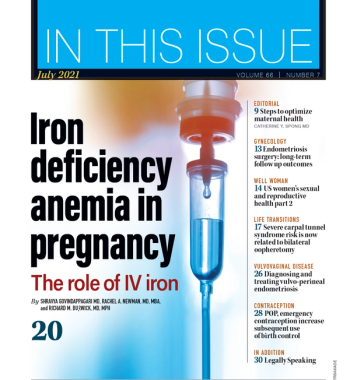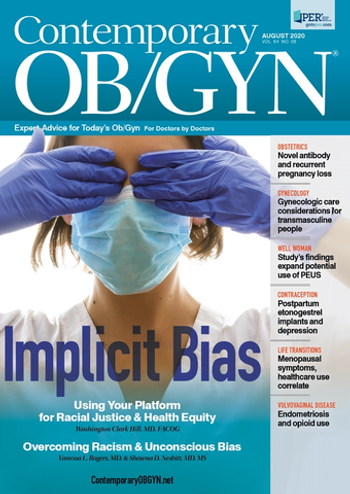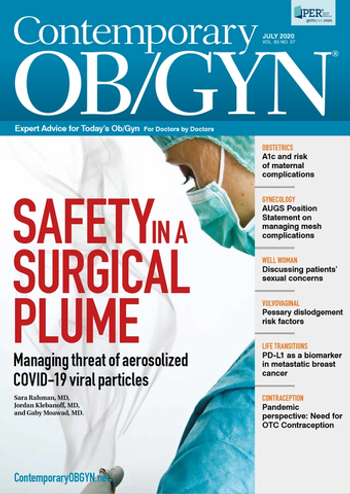
Here's what to expect this week on Contemporary OB/GYN®.

Here's what to expect this week on Contemporary OB/GYN®.

It's been a busy week for the Contemporary OB/GYN® team.

Here's what to look out for this week on Contemporary OB/GYN®:

It's been a busy week for the Contemporary OB/GYN® team.

This month's cover story examines iron-deficiency anemia in pregnancy and the role of intravenous iron. Plus, an extreme case of fraud demonstrates the reach of federal statutes enacted to prevent and punish those who commit health care fraud.

What to look for this week on Contemporary OB/GYN®

It was a very busy week for the Contemporary OB/GYN® team.

Here's what to expect this week from Contemporary OB/GYN®.

What to look for this week on Contemporary OB/GYN®

It was a busy week for the Contemporary OB/GYN® team.

It was a busy week for the Contemporary OB/GYN® team.

What to look for this week on Contemporary OB/GYN®

Here's what you missed this week.

As the year comes to a close, we would like to recognize all of the people who have contributed to the growth and continued success of Contemporary OB/GYN.

Highlights from articles featured in the September issue of Contemporary OB/GYN.

What did you think of this month’s feature stories?

In a recent interview from Medical Economics, Thomas Ely, DO, discusses how the pandemic is affecting physicians.

In a recent podcast episode from OncLive, Don S. Dizon, MD, FACP, FASCO, discusses the primary physical and residual psychological effects of gynecologic cancers on women’s sexual health.

Senior Editor Angie DeRosa and Associate Editor Lindsey Carr sat down with Drs. Vanessa Rogers and Shawna Nesbitt to discuss racism and unconscious bias in ob/gyn practice.

We want to hear from you!

The U.S. government had entered into an agreement with Pfizer and BioNTech to acquire the first 100 million doses of a potential COVID-19 vaccine.

Did you know that up to 75% of medical residents develop burnout during their training period, with nearly 30% developing clinical symptoms of depression?

According to a new study in the American Journal of Health-System Pharmacy, chemotherapy stewardship programs may result in cost savings to both patient and health systems.

Although clinicians are getting used to incorporating telehealth into everyday practice, ensuring they get paid for these virtual visits is essential.


Three major Ohio universities and 4 hospitals have joined with the March of Dimes Foundation to establish a new collaborative research program aimed exclusively at finding the unknown causes of premature birth.

One in 3 women nulliparous women with a short cervix is prescribed some type of activity restriction, despite lack of benefit in prevention of preterm birth (PTB). Those are the findings from a secondary analysis of data from the Short Cervix and Nulliparity trial. Published in Obstetrics & Gynecology, it is accompanied by a commentary titled “Bed Rest in Pregnancy: Time to Put the Issue to Rest” and an ethical argument for dismissing the practice.

Maternal-fetal exchange of cells may result in deposition of male DNA to the mother’s brain that lasts a lifetime and has potential health effects. So say the results of a study published in PLoS One of autopsied brain tissue from women aged 32 to 101 without neurologic disease or with Alzheimer’s disease.

A large prospective study links onset of snoring in pregnancy with increased risk of gestational hypertension and preeclampsia. The results, published in The American Journal of Obstetrics & Gynecology, suggest that simply asking pregnant patients about snoring could result in better maternal and fetal outcomes.

A systematic review and meta-analysis of 20 studies representing experience in 68,680 patients shows that use of omega-3 fatty acid supplementation does not improve cardiovascular risk factors. Published in The Journal of the American Medical Association, the report examined evidence from randomized clinical trials (RCTs) in MEDLINE, EMBASE, and the Cochrane Central Register of Controlled Trials from as early as 1989 through August 2012.